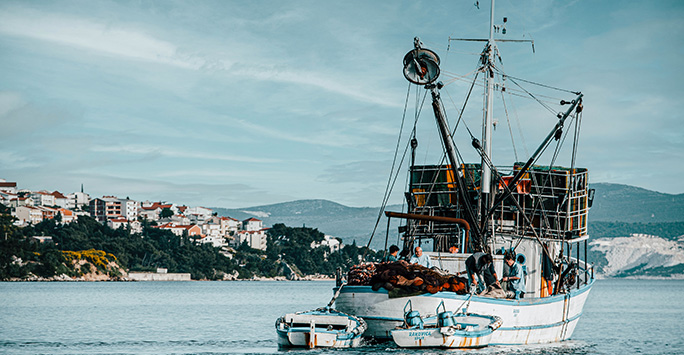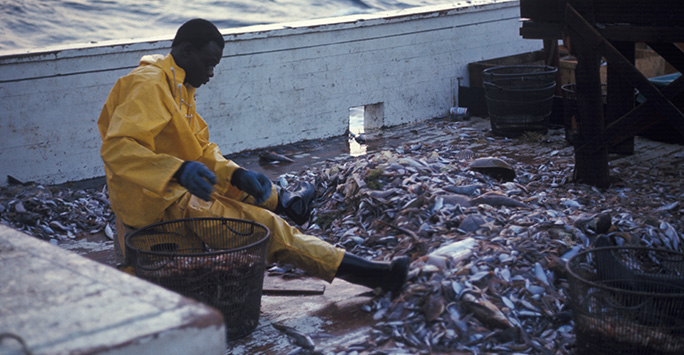Modern Slavery and the Fishing Industry
Posted on: 24 February 2022 by Molly Green in Blog

Where research and public awareness are still scarce on modern slavery and human trafficking, the field is recently gaining more attention. Modern slavery is an issue worldwide, affecting countries regardless of their development and affecting individuals regardless of their demographic. However, an affected demographic that often gets forgotten about is that of the fishing industry.
The public have long been aware of the apparent danger to the lives of fishermen and women: the water. However, one of the most prolific dangers they face is that of other human beings. Due to the regulations and laws being placed within the fishing world, there are many cases of human rights abuse, labour abuse, slavery, and even extreme cases of murder in order to hide the act of modern slavery or the illegal fishing. Where, in the past few years, certain academic researchers have attempted to shine a light on this issue, it is still lacking in the necessary awareness. This awareness is vital as without it, governments may not feel the need to act. With the recent release of the renowned Seaspiracy documentary, the ball started rolling on the vital conversation of modern slavery in the fishing world. Nevertheless, the issue was and is overshadowed by the focus on the environmental damage that the fishing industry is causing.
This overshadowing focus causes issues as, where the environment is receiving the attention needed for the creation of laws to protect it, the human beings directly affected are not. It is down to individuals to put pressure on companies and governments to push for laws and policies (or at least update the old ones) that would protect fishermen and women from conditions of modern slavery at sea, but the public are not going to do this without first being made aware of its seriousness. To demonstrate the seriousness of the issue, between the years of 2011 and 2016 in Thailand, 76% of the workers in the fishing industry had been subject to slavery conditions and 37% were trafficked into the ‘job’. Whilst it is incredibly difficult to conduct research on this population, there have been many media reports of these issues aboard American and British fishing boats too. Despite the common misconception of this problem solely existing in the region of Southeast Asia. What makes the matter worse is that the existing legislation that does draw on slavery within the fishing industry, does not provide a solution to the main cause: businesses. Overfishing, or fishing in general, is done with the main aim of financial gain (which, ironically, is the same reason for modern slavery). These companies then supply their fish to a variety of other companies, thus forming a chain of companies that are indirectly involved in the enslavement of human beings. Therefore, if legislation does not actually require companies or businesses to actively attempt to stop modern slavery from occurring, or from occurring in their supply chains, then why would they?

A fisherman sits on a boat surrounded by fish and fishing nets, after a big catch.
In the UK, our main form of defence against modern slavery is the Modern Slavery Act 2015. It was implemented to provide survivors of trafficking with the means of a defence against crimes they have been forced to commit, and as a criminal justice tool to prosecute traffickers with. Despite the crucial step that this piece of legislation has provided, it does not hold companies liable for allowing slavery or being complacent about it, whether done so directly or through supply chains. This is the case with most other national and international anti-trafficking legislation, where encouraging businesses to be transparent about their supply chains is all well and good, there is no justice delivered when harm is done.
Human life should hold more value than financial gain, but not everyone has this view. Where it is easy to suggest that businesses hold an ethical standpoint on human right’s issues such as modern slavery and cease to purchase their products from fishing companies whose ‘staff’ are enslaved, not all people will cooperate. The only solution is for governments, organisations, researchers and even members of the public to work together to send a clear message to the private and public sector that they will be held accountable for failing to prevent modern slavery from taking place within their industry.
The most recent update on this issue as of February 8th: over 100 companies and investors released a statement calling on the European Union to adopt accountability legislation on mandatory human rights and environmental due diligence.
Keywords: Modern Slavery, Fishing Industry, Modern Slavery Act 2015, Human rights abuse, labour abuse, slavery, illegal fishing, Seaspiracy .